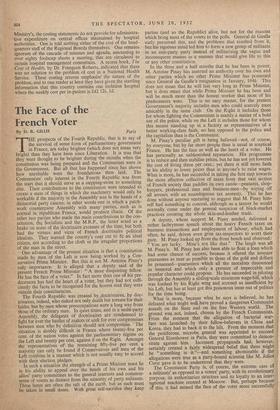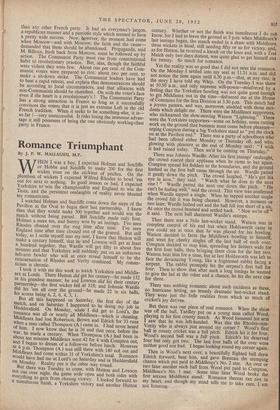The Face of the French Voter
THE prospects of the Fourth Republic, that is to say of the survival of some form of parliamentary government in France, are today brighter (which does not mean very bright) than they have been since Liberation. It is true that they were thought to be brighter during the months when the constitution was being prepared and the Communists were in the Government. But all that has happened since has shown how unreliable were the foundations then. laid. The Communists' only interest in the Fourth Republic was from the start that it should serve as a stepping-stone to something else. Their contributions to the constitution were intended to create a state of things in which the machinery would only be workable if the majority in the Assembly was in the hands of a dictatorial party caucus; in other words one in which a patch- work counterpane Assembly with many parties, such as is normal in, republican France, would produce chaos. Of the other two parties who made the main contributions to the con- stitution, the Socialists and the M.R.P., the latter acted as a brake on some of the doctrinaire .excesses of the time, but both had the virtues and vices of French doctrinaire political idealists. They wanted the country's coat cut to fit an ideal citizen, not according to the cloth or the irregular proportions of the man in the street.
One advantage of the present situation is that a constitution made by men of the Left is now being worked by a Con- servative Ptime Minister. But this is not M. Antoine Pinay's only importance. It is alleged that a deputy said of the present French Prime Minister: " A most disquieting fellow. He has the face of a voter." In fact more than one of his pre- decessors has had the heart of a voter, but they had not suffi- ciently the faces to be recognised for the honest men they were outside their constituencies.
The Fourth Republic was created by .doctrinaires, by doc- trinaires, indeed, who risked not only death but torture for their faiths, but by men whose preoccupations were a long way from those of the ordinary man. In quiet times, and in a multi-party Assembly, the delegates of doctrinaires are condemned to fight for ever the battles of zealots or seek for ever compromises between men who by definition should not compromise. ' The situation is doubly difficult in France where twenty-five per cent. of the nation votes against the parliamentary regime on the Left and twenty per cent. against it on the Right. Amongst the 'representatives of the remaining fifty-five per cent. a majority can only be found if Conservatives and men of the Left combine in a manner which is not usually easy to accord with their electiod pledges. In such a situation the strength of a Prime Minister must lie in his ability to appeal over the heads of his own and his allies' party committees to the general interests, and common- sense of voters as distinct from the minority of party militants. These latter are often the salt of the earth, but as such must be taken in small doses. With great self-sacrifice they keep parties (and so the Republic) alive, but not for the reasons which bring most of the voters to the polls. General de Gaulle early perceived this, and the problems that resulted from it, but his rigorous mind led him to form a new group of militants in an anti-party party instead of militarising the vague and inconsequent masses in a manner that would give life to this or any other constitution.
In the three and a half months that he has been in power, M. Antoine Pinay has asserted an authority over his own and other parties which no other Prime Minister has possessed since General de Gaulle's resignation in January, 1946. This does not mean that he will last very long as Prime Minister, but it does mean that while Prime Minister he has been and will be much more than the honest worker that most of his predecessors were. This is no easy matter, for the present Government's majority includes men who could scarcely meet amicably in the same club. On the Right it includes those for whom fighting the Communists is mainly a matter of a bold use of the police, while on the Left it includes those for whom this means standing up in a factory as representatives of a better working-class faith, no less opposed to the police and the capitalists than is the Communist.
M. Pinay's peculiar gift is being believed—not, of course, by everyone, but by far more people than is usual in sceptical France. He has the face as well as the heart of a voter. He has personally an unblemished reputation. His programme is to reduce and then stabilise prices, but he has not yet lowered the cost of living three per cent.; yet there is still more faith in his ability to lower prices than in anyone's to raise wages. What is more, he has succeeded in taking the first step towards the more effective collection of taxes from that vast section of French society that paddles its own canoe—peasants, shop- keepers, professional men and business-men--by wiping off all arrears with an unambiguous tax amnesty. This he has done without anyone venturing to suggest that M. Pinay him- self had something to conceal, although as a tanner he would normally come under the general suspicion of black-market practices covering the whole skin-and-leather trade.
A deputy, whose support M. Pinay needed, delivered a rather lachrymose speech about the heavy French taxes on business transactions and employment of labour, which had often, he said, driven even grim tax-inspectors to avert their gaze. M. Pinay looked up from the front bench and observed : You are lucky. Mine's not like that." The laugh was all M. Pinay's. M. Pinay has also been able to float a loan which had some chance of success, because it offered the investor guarantees as near as possible to those of the gold and dollars he possessed—guarantees which all the moralists denounced as immoral and which only a premier of impeccable and popular character could propose. He has succeeded in piloting through the Assembly a sliding-scale minimum wage-bill, which was loathed by his Right wing and scorned as insufficient by his Left, but has at least got this poisonous issue out of politics for the time being.
What is more, because what he says is believed, he has defeated what might well have proved a dangerous Communist assault on the State and on the free Western world. The ground was not, indeed, chosen by the French Communists. From the moment that the allegation of bacterial war- fare was launched by their fellow-believers in China and Korea, they had to back it to the hilt. From the moment that the pestiferous, microbe general was appointed to succeed General Eisenhower in Paris, they were committed to demon- strate against him. Incessant propaganda had, however, certainly created a fairly widespread belief that there might be " something in it "—and something abominable if the allegations were true as a party-bound scientist like M. Joliot Curie gave it to be understood that they, were. The Communist Party is, of course, the extreme case of a militants' as opposed to a voters' party, with its revolutionary purpose, its authoritarian structure and its loyalty to an inter- national machine centred at Moscow. But, perhaps because or this, it had mimed 'the face of the voter more successfully than any other French party. It had an everyman's jargon, a republican manner and a patriotic style which seemed to have a pretty wide success. Now, however, the moment had come when Moscow—and with Moscow, the faith and the cause— demanded that these should be abandoned. Propaganda, said M. Billoux, fresh back from Moscow, must be followed up by action. The Communist Party must rise from constitutional habit to revolutionary practice. But, alas, though the faithful were violent they were few. About one per cent. of the Com- munist voters were prepared to riot; about two per cent. to make a sit-down strike. The Communist leaders have had to beat a rapid retreat, and explain that demonstrations should be according to local circumstances, and that alliances with non-Communists should be cherished. On with the voter's face even if the heart is a revolutionary's ! The Communist Party has a strong attraction in France so long as it successfully convinces the voters that it is just an extreme Left in the old French tradition. When it seeks to be something-else, it is— so far !—very unsuccessful. It risks losing the immense advan- tage it still possesses of being the one obviously working-class party in France.



















































 Previous page
Previous page